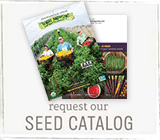Why We Choose to Breed Our Own Organic Varieties
 Since its inception in 2004, High Mowing’s robust breeding and research program has invested resources in finding and breeding superior genetics exclusively in organic varieties so our growers can experience the best possible results when they grow with our seed. Breeding our own varieties for organics allows us to develop the specific qualities that organic growers require for their crops to thrive.
High Mowing’s owner and founder, Tom Stearns, likes to say that “organic growers are using a dull tool when they plant seeds from conventional agriculture.” As a seed company, it is our job to find and breed the varieties that will perform reliably in a wide variety of conditions, and for us at High Mowing these are all organic conditions. Seed crops bred for organic production models thrive in organic production models. At High Mowing, we work exclusively under organic management, so any selections made in our breeding program are adapted to organic growing conditions.
Since its inception in 2004, High Mowing’s robust breeding and research program has invested resources in finding and breeding superior genetics exclusively in organic varieties so our growers can experience the best possible results when they grow with our seed. Breeding our own varieties for organics allows us to develop the specific qualities that organic growers require for their crops to thrive.
High Mowing’s owner and founder, Tom Stearns, likes to say that “organic growers are using a dull tool when they plant seeds from conventional agriculture.” As a seed company, it is our job to find and breed the varieties that will perform reliably in a wide variety of conditions, and for us at High Mowing these are all organic conditions. Seed crops bred for organic production models thrive in organic production models. At High Mowing, we work exclusively under organic management, so any selections made in our breeding program are adapted to organic growing conditions.


Categories: Breeding / Research Program & About High Mowing Organic Seeds
Posted On: July 17 2017
Posted By: High Mowing Organic Seeds
Search
Recent Posts
Categories
- About High Mowing Organic Seeds
- Articles by Farmer Paul Betz
- Articles by Megen Hall
- Ask The Expert
- Beginner Gardeners' Guide
- Breeding / Research Program
- Commercial Growing
- Contests
- Covid-19 Updates
- Crop Talk
- Events
- Farm Ethics
- Farmer Authors
- GMOs
- Greenhouses
- Growing Tips
- Health and Wellness
- Kids and Gardening
- Philosophy
- Plant Diseases
- Plant Pests
- Recipes
- Seed Bin Article - 2011
- Seed Saving and Production
- Soil Health
- Story of a Seed
- Trials
- Uncategorized
- Variety Highlights
- Winter Growing
Archives
- April 2024
- March 2024
- February 2024
- January 2024
- December 2023
- November 2023
- October 2023
- September 2023
- August 2023
- July 2023
- June 2023
- May 2023
- April 2023
- March 2023
- February 2023
- January 2023
- December 2022
- November 2022
- October 2022
- September 2022
- August 2022
- July 2022
- June 2022
- May 2022
- April 2022
- March 2022
- February 2022
- January 2022
- December 2021
- November 2021
- October 2021
- September 2021
- August 2021
- July 2021
- June 2021
- May 2021
- April 2021
- March 2021
- February 2021
- January 2021
- December 2020
- November 2020
- October 2020
- September 2020
- August 2020
- July 2020
- June 2020
- May 2020
- April 2020
- March 2020
- February 2020
- January 2020
- December 2019
- November 2019
- October 2019
- September 2019
- August 2019
- July 2019
- June 2019
- May 2019
- April 2019
- March 2019
- February 2019
- January 2019
- December 2018
- November 2018
- October 2018
- September 2018
- August 2018
- July 2018
- June 2018
- May 2018
- April 2018
- March 2018
- February 2018
- January 2018
- December 2017
- November 2017
- October 2017
- September 2017
- August 2017
- July 2017
- June 2017
- May 2017
- April 2017
- March 2017
- February 2017
- January 2017
- December 2016
- November 2016
- August 2016
- July 2016
- June 2016
- April 2016
- March 2016
- February 2016
- January 2016
- December 2015
- November 2015
- October 2015
- September 2015
- August 2015
- July 2015
- June 2015
- May 2015
- April 2015
- March 2015
- February 2015
- January 2015
- December 2014
- November 2014
- October 2014
- September 2014
- August 2014
- July 2014
- June 2014
- May 2014
- April 2014
- March 2014
- February 2014
- January 2014
- December 2013
- November 2013
- October 2013
- September 2013
- August 2013
- July 2013
- June 2013
- May 2013
- April 2013
- March 2013
- February 2013
- January 2013
- December 2012
- November 2012
- October 2012
- September 2012
- August 2012
- July 2012
- June 2012
- May 2012
- April 2012
- March 2012
- February 2012
- January 2012
- December 2011
- November 2011
- September 2011
- August 2011
- July 2011
- June 2011
- May 2011
- April 2011
- March 2011
- February 2011
- January 2011
- December 2010
- January 2008
Recent Comments
- Jennifer Munoz on Our Garden Beanpole Giveaway
- Quinn Piper on Our Garden Beanpole Giveaway
- Cesar on Our Garden Beanpole Giveaway
- Cathy Owen on Our Garden Beanpole Giveaway
- Dan Hayes on Our Garden Beanpole Giveaway
My Wish Lists


